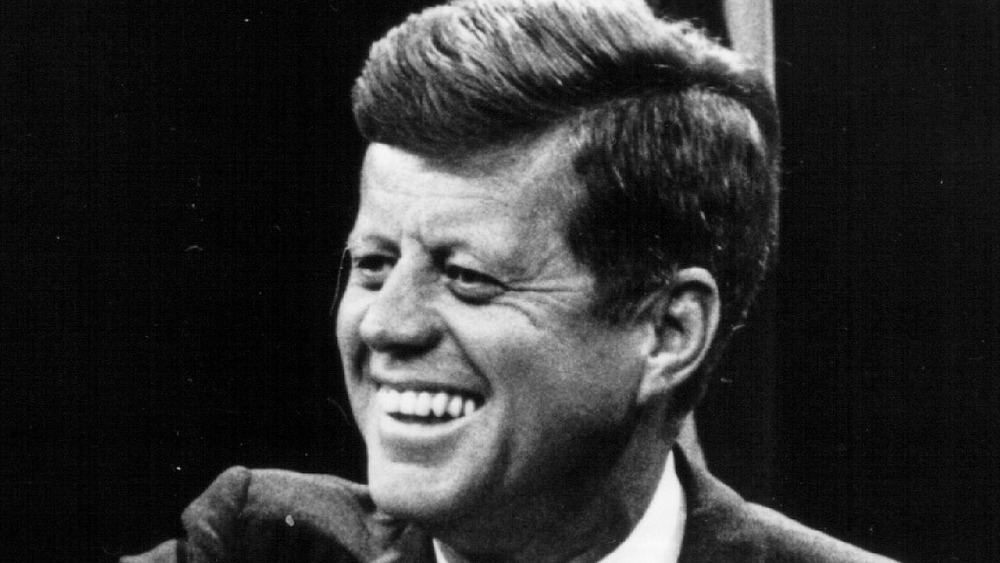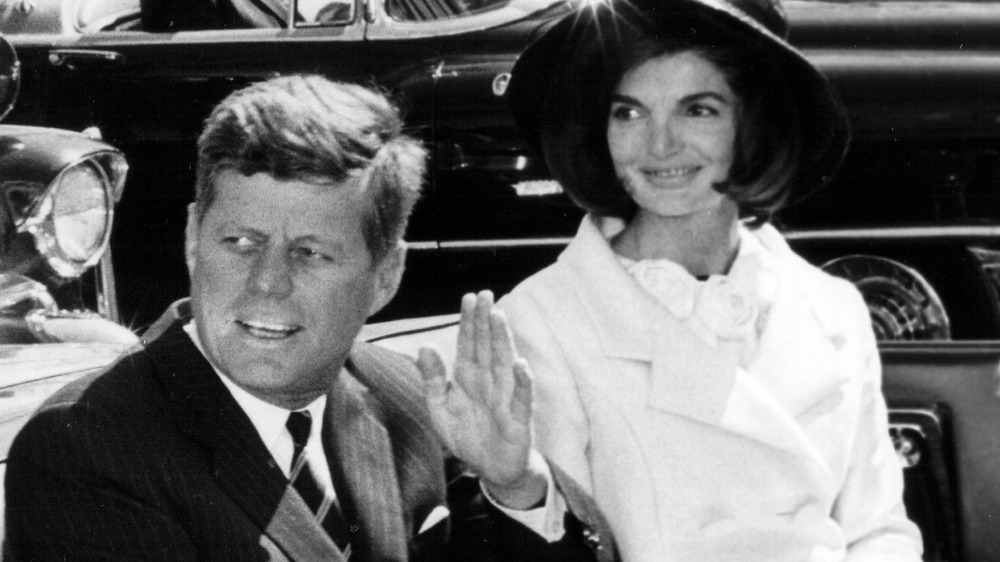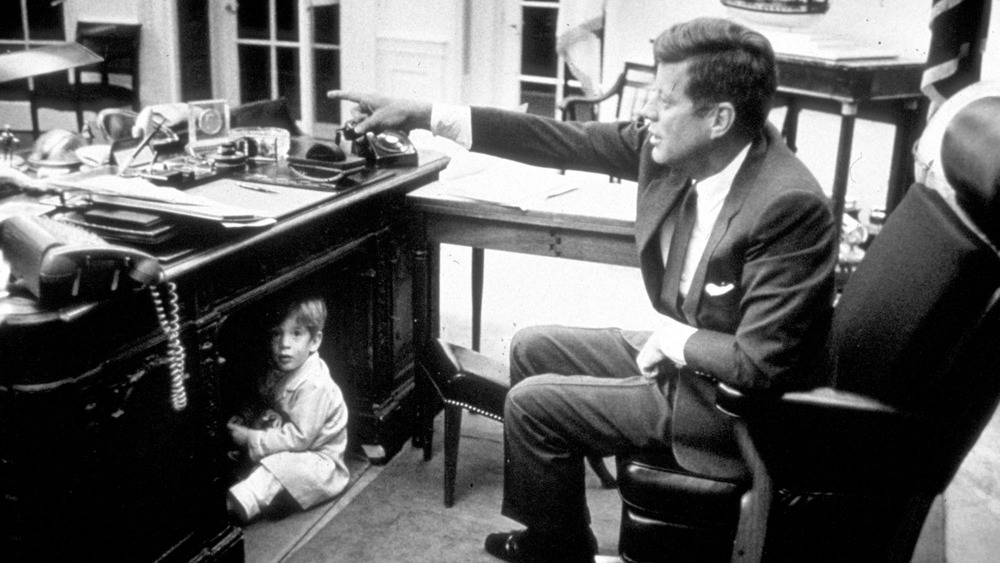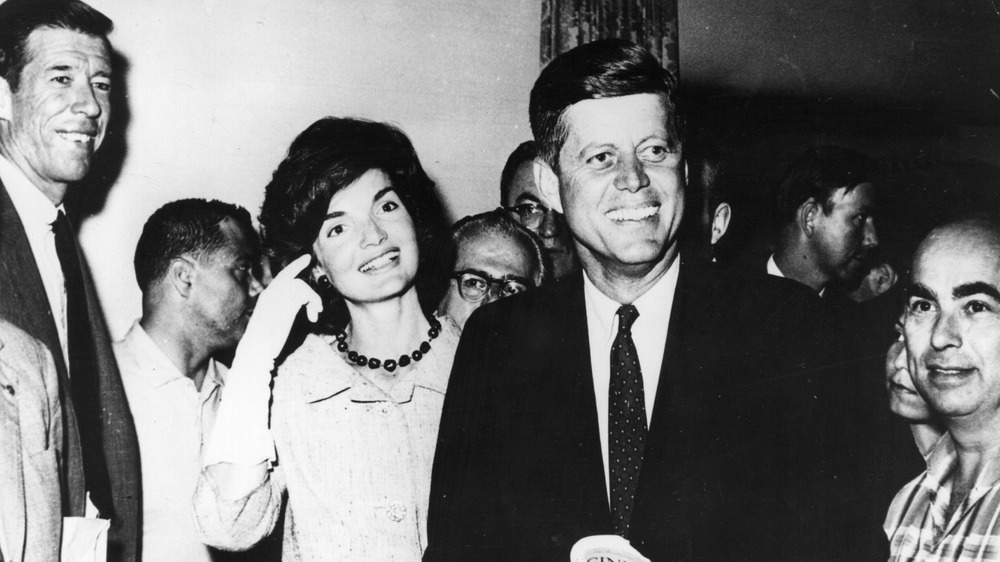The Real Reason JFK Was Begged To Wear Hats
John Fitzgerald Kennedy was many things. The 35th President of the United States; the first Catholic president; the fourth (and so far, last) president to be assassinated.
The beloved POTUS was also a fashion icon, of a sort, albeit for all the wrong reasons. Indeed, so famous was the Massachusetts politician for not wearing hats that something of an urban legend has sprung up that he single-handedly killed the hat industry (or at the very least, made it a shell of what it once was).
The hat industry, for its part, repeatedly entreated Kennedy to don a hat, for the sake of jobs (and investors' pocketbooks). On April 2, 2021, the JFK Library's official Twitter account revealed some personal correspondence from hat industry executives, laying out the reasons they were so keen to get a hat on Kennedy's head. The letters provide a glimpse into the death throes of a moribund industry, as well as the sometimes-tenuous relationship between politics and commerce.
Fashionable men and women always wore hats, until they didn't
As NPR News noted, there was a time in American history when very few people — men or women — would be caught dead in public without a hat. It didn't matter if it was a Stetson, a pork pie, a bowler, a cloche, or a trilby: if you were outside and old enough to vote, there was a hat on your head.
By the early 1960s, however, things had started changing, and men and women were daring to go out in public without their heads covered. And on January 20, 1961, John Fitzgerald Kennedy placed his hands on the Bible and repeated the oath of office that would install him as President of the United States — without a hat on his head.
It was the beginning of a "thing" for Kennedy: rarely, if ever, would he be seen or photographed wearing a hat, much to the embarrassment of fashionistas, to whom not wearing a hat was like not wearing socks or pants. Not long after, the rest of America followed suit, and soon the hat industry found itself with a terrifying shortage of customers.
The hat industry got desperate
In the days before Twitter, the way to get a President's attention was to sit at a typewriter and put ink on paper, then send your correspondence to Pennsylvania Avenue and hope he saw it.
Such was the case with multiple hat industry executives, who wrote to the president, practically begging him to put on a hat.
As you can see in the tweets below, the desperation was almost palpable. What's more, the industry was clear that, unless and until Kennedy started donning headwear, profits and jobs were on the line.
Throughout his presidency, hat industrialists pleaded with JFK to wear hats more often. From the Hat Corp. of America (tweeted by the JFK Library): "On behalf of the people in our industry I should like to solicit your assistance. Please, Mr. President, wear a hat.... Anybody's hat." From the VP of Consolidated Millinery Co.: "The women's and men's hat industry is a part of the American economy which you can revitalize... just by personal example. This slight sacrifice of your personal freedom can not only rejuvenate but save an industry."
JFK probably didn't kill the hat industry, though
These days, the "fact" that JFK killed the hat industry is one of those things that sits in the hazy netherworld between myth and legend, like George Washington chopping down a cherry tree (which also didn't happen). In fact, the hat industry was dying before Kennedy came on the scene. He didn't so much single-handedly destroy the industry as much as he was a visible example of a larger trend. In other words, the hat industry wasn't begging him to wear hats because he was killing the industry, but because they hoped he could save it. So if JFK didn't kill hats, then who did?
NPR News writer Robert Krulwich posits that it was President Eisenhower, not Kennedy, who killed the hat. Specifically, Ike was responsible for the interstate highway system, which, among other things, enabled Americans to get from here to there in a car, rather than public transportation. Owing to the lack of headroom in a car (as compared to a bus or train), hats became more trouble than they were worth, and so they became redundant.
Of course, that's just one man's theory, and the reality is that fashion changes, whether organically or through outside influence (bikinis became a thing when the US started dropping atom bombs on Bikini Atoll, for example). So whether or not JFK killed the hat, or was just a witness to its death, shall remain a mystery.



